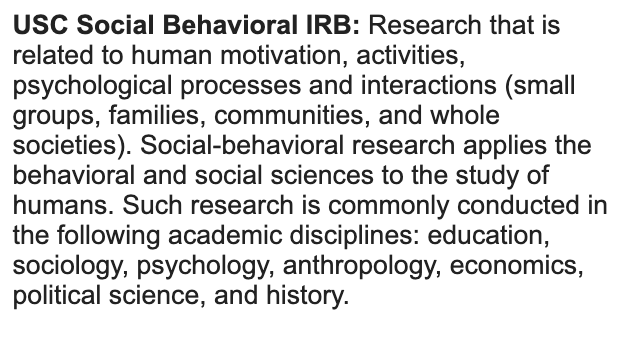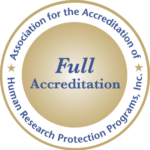The term “social-behavioral” refers to human motivations, activities, psychological processes and interactions (small groups, families, communities, and whole societies). Social-behavioral research applies the behavioral and social sciences to the study of humans. Such research is commonly conducted in the following academic disciplines: education, sociology, psychology, anthropology, economics, political science, and history.
Some social-behavioral research funded by NIH must be registered as a clinical trial.
Social Behavioral Research Methods
- Interviews, focus groups, and surveys
- Studies of existing records
- Experimental designs involving exposure to stimulus or intervention (in person, over the phone, or online)
- Observation:
- With or without observer interaction
- Public information (e.g., vital statistics, motor vehicle registrations, or court records) and/or non-public information (e.g., medical or educational records in which the subjects are identified)
- Conducted in public places, laboratories, or in private settings (e.g., a clinic, therapist’s office, subject’s home)
Risks/Harm
Risk is the probability of harm or injury (physical, psychological, social, or economic) occurring as the result of participation in a research study. Most social behavioral research involves no physical intervention and therefore no physical risk, but the potential risks of social or psychological harm must still be considered. Researchers must consider the following risks when conducting their study.
Social harm can occur when:
- questions about illegal behaviors or immigration status may damage subjects’ reputation or raise legal concerns
- information about subjects’ activities may place them at risk of harm or legal action
- confidentiality is compromised, jeopardizing employment and/or insurance coverage.
Psychological harm can occur when:
- the research involves deception
- the research provides subjects with unwelcome and disturbing information
- the research questions or procedures can cause stress, embarrassment, or raise painful memories.
Although most social and psychological risks are minimal and transitory, investigators must be aware of the potential for harm. The IRB will want to know how such outcomes will be minimized or addressed.
iStar
When submitting an application in iStar you will see the following in section 1.5.

Hover over the ![]() for a definition of USC Social Behavioral IRB:
for a definition of USC Social Behavioral IRB:

Reference: Methods and Risks/Harm sections adapted from Health and Human Services’ Institutional Review Board Guidebook, Chapter V: Biomedical and Behavioral Research: An Overview.

